|
ScienceMark2:
Science Mark uses multiple benchmarking processes to get an overall idea of how the processor will perform in the real-world.
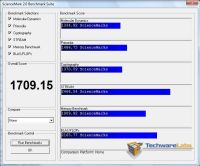 |
 |
CPU @ 2.6GHz Geforce 9800GTX+ |
CPU @ 3.19GHz Geforce 9800GTX+ |
The results of ScienceMark2 are also as expected. The X4 810 processor really shines here. Comparing the X4 810 to the 9950 X4 running at the same 2.6GHz the 45nm and other technology shows you that no matter if the processor is running at the same GHz the X4 810 still pulls out ahead and not for much more coin from your pocket either. Click here to see the results from the review of the 9950 X4 review using ScienceMark2.
WinRar:
Winrar's internal benchmark utility shows what the real time speed in KB/s that would be when using both single-thread and multi-threaded tasks.
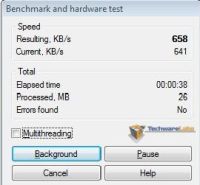 |
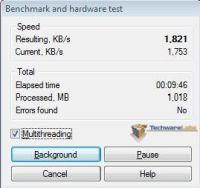 |
Single threaded at stock 2.6GHz |
Multithreaded at stock 2.6Ghz |
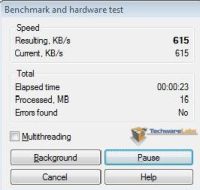 |
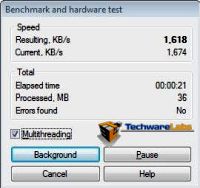 |
Single threaded at 3.19GHz |
Multithreaded at 3.19GHz |
The results of Winrar benchmarks show in both single and multithreaded tests that over clocking the processor does not increase the KB/s but rather decreased the end score. This is very interesting and curious that the 2.6GHz results are actually best for day to day application use.
Kribibench:
"The essential task in the final phase of the development of a 3D rendering engine, much like for a racing car engine, is tuning for the best possible performances on actual machines. After each small change in the program code, very precise timings show us the amount of speedup achieved (if any). For this purpose, we time with a stopwatch the rendering of a sequence of images, the laps of our racecourse. "
Kribi Bench is a software render which renders a 3D Model and reports the average frames per second. For our testing, we decided to render two of the more extensive 3D Models, both of which were included in the program. The first model we decided to render was "spongeexplo.d", this model consisted of 19.2 million polygons, and resulted in 11.9133 frames per second. The second model we rendered was "ultra.d" consisting of 16.6 Billion polygons, which rendered at 3.37446 frames per second.
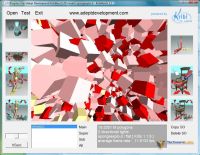 |
 |
| Sponge Explode at 2.6GHz |
Sponge Explode at 3.19GHz |
 |
 |
Ultra.d at 2.6GHz |
Ultra.d at 3.19Ghz |
Over clocking the processor to 3.19GHz we were able to get a little better frames per second with "spongeexplo.d" at 18.8775 frames per second and the "ultra.d" results of 4.88406 frames per second. This a welcomed result for those of us who are looking to get a little more performance out of their processors during intensive gaming.
REALTIME PRICING ON THE AMD PHENOM II 940




